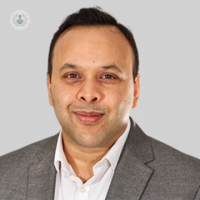Anal fistula: everything you need to know
Written by:Consultant colorectal and general surgeon Mr Ashish Sinha explains everything you need to know about anal fistula, including the surgical options available to treat the condition.

What is an Anal fistula?
An anal fistula is an abnormal connection or tunnel that forms between the inside of the anus and the outside skin around the anus. This tunnel connects the anal gland with an opening in the outer skin surrounding the anus. The fistula can traverse the rings of the sphincter muscles which are located at the opening of the anus are used for defecation control. When considering treatment for anal fistula, it is important to appreciate its relation to the sphincters, to minimise damage to the sphincter muscle complex and any subsequent change in continence.
How common is anal fistula?
It is estimated that 1-2 per 10,000 Europeans suffer from anal fistula. However, population-based studies on anal fistula epidemiology can be limited and outdated. These statistics may not be accurate and the prevalence of anal fistulas may be higher because many patients are treated with antibiotics in the community and some abscesses spontaneously regress or discharge.
What are the surgical options for anal fistula?
Surgical treatment is bespoke and varies from patient to patient. Surgical treatment is individualised and frequently involves scans, clinical assessment, pre-existing anal sphincter quality and functional outcomes, obstetric history, surgical history and patient co-morbidities. Surgery can range from seton insertion, laser treatment, laying open of fistula tract and many other approaches.
Fistulotomy
Fistulotomy is a surgical procedure which involves cutting along the whole length of the fistula to open it, meaning that it can heal as a flat scar. It is one of the most effective treatments for many anal fistulae.
Seton surgery
Another surgical option for anal fistula is seton surgery. A seton is a thin strong suture which is placed in/through the fistula tunnel in order to keep it open and prevent abscess formation. The seton will be left in place for several weeks or months, as a way of permitting adequate drainage of the fistula tract prior to fistulotomy.
During seton surgery, a surgeon will place a piece of thin surgical thread inside the fistula to help drain any infection and allow it to heal, permitting the infection to drain and heal without damaging the anal sphincter muscles. They may also cut the part of the fistula that does not involve the anal sphincter muscles.
Surgery is usually carried out under general anaesthesia to aid healing of the fistula and to avoid damaging the sphincter muscles.
What are some risks associated with anal fistula surgery?
As with any surgery, anal fistula surgeries can carry some risks. These include recurrent infections, which may require a course of antibiotics and severe cases may need to be treated in the hospital. There is also a risk of recurrence of the fistula, because it can sometimes reoccur, even if surgery has been performed. Infrequently, bowel function can be altered in certain patients following extensive fistula surgery.
Recovery for anal fistula
Recovery time for anal fistula surgery is dependent on the type of surgery you have. Recovery following a fistulotomy is normally between four and six weeks. In certain cases, it may take longer for the wound to fully heal. Most patients will have a follow-up appointment around four to eight weeks after surgery.
It is essential to follow the doctor’s instructions for postoperative care. They may advise that you avoid sexual intercourse or avoid inserting anything into the rectum or vagina until they say it is safe to do so.
It is also recommended that you drink lots of fluids and eat foods rich in fibre, such as brown rice, and barley, as well as fruits such as banana, orange, apple and vegetables such as broccoli, spinach and carrot.
If you would like to book a consultation with Mr Sinha, do not hesitate to do so by visiting his Top Doctors profile today.


